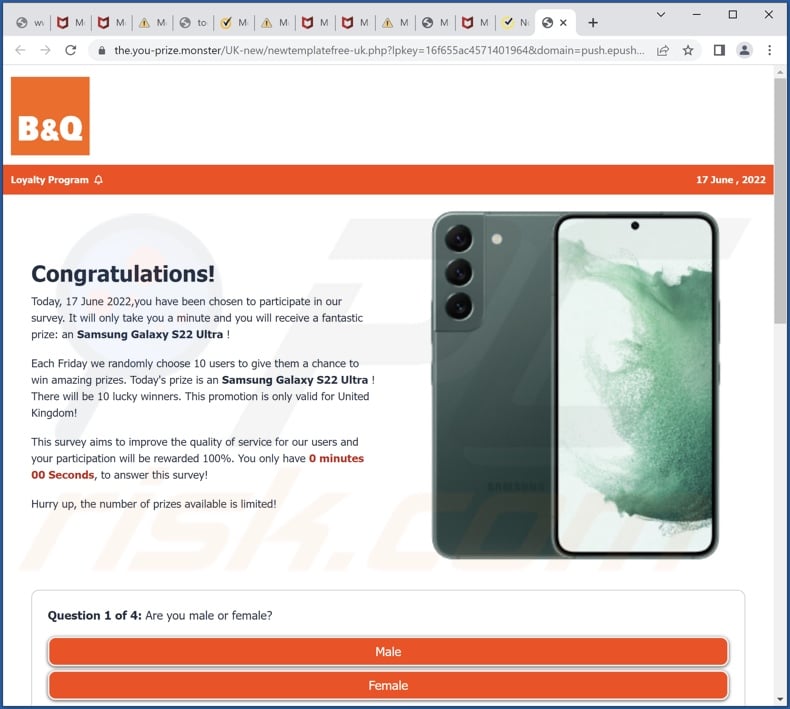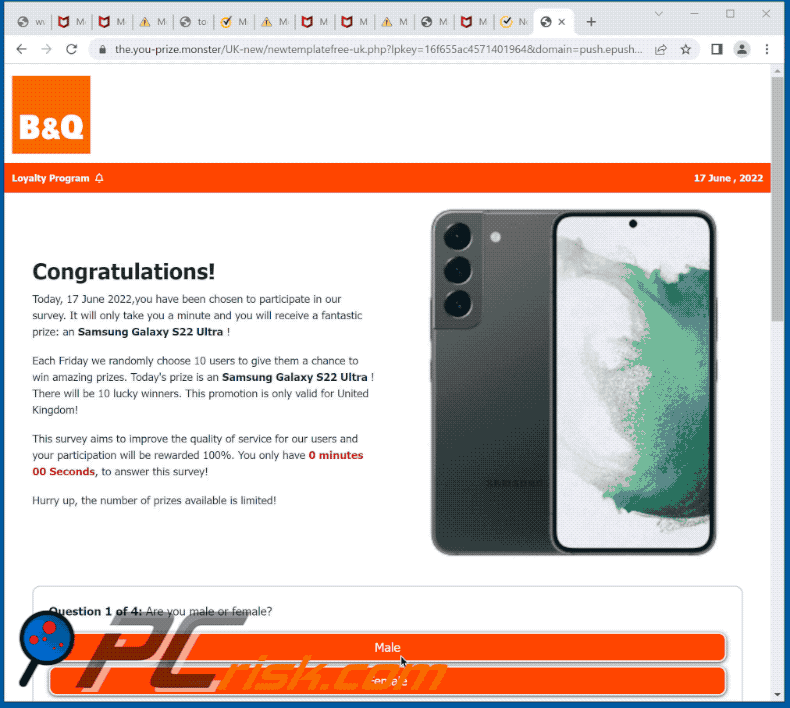Do not trust websites running fake loyalty programs that promise prizes
Phishing/ScamAlso Known As: Loyalty Program scam website
Get free scan and check if your device is infected.
Remove it nowTo use full-featured product, you have to purchase a license for Combo Cleaner. Seven days free trial available. Combo Cleaner is owned and operated by RCS LT, the parent company of PCRisk.com.
What is the "Loyalty Program" scam?
While inspecting rogue webpages, our research team discovered the "Loyalty Program" scam. It makes false claims about users having a chance of winning a prize by completing a survey. It must be emphasized that the promised gift is fake, and any legitimate entities mentioned in this scam are in no way associated with it. Schemes of this kind typically operate as phishing scams or attempt to trick victims into paying fake fees.

"Loyalty Program" scam overview
This scam claims that the visitor can win a Samsung Galaxy S22 Ultra by completing a multi-choice questionnaire. Supposedly, this promotion is only valid in the UK and takes place weekly when ten lucky winners are chosen. However, it is worth noting that there are many variations of loyalty-themed scams, which are typically presented as those hosted by various stores and service providers (e.g., Amazon, TESCO, Walmart, and similar).
Once the survey is completed, the scam displays images of gift boxes. After multiple clicks, a pop-up - stating that the user has won the Samsung Galaxy S22 Ultra - is shown. Then the user is redirected to another scam site.
Typically, scams of this type target a wide variety of sensitive information, e.g., personally identifiable details, online bank account log-in credentials, credit card numbers, etc. The collected data can be abused or sold to third-parties (potentially, cyber criminals). Prize-related scams often request users to make payments to receive the nonexistent items.
To summarize, by trusting scams like "Loyalty Program" - users can experience severe privacy issues, financial losses, and even identity theft.
| Name | Loyalty Program scam website |
| Threat Type | Phishing, Scam, Social Engineering, Fraud |
| Fake Claim | For completing a survey users will receive a prize |
| Related Domains | you-prize[.]monster, todayspacestar169[.]click |
| Detection Names (you-prize[.]monster) | N/A (VirusTotal) |
| Serving IP Address (you-prize[.]monster) | 172.67.223.20 |
| Distribution methods | Compromised websites, rogue online pop-up ads, potentially unwanted applications. |
| Damage | Loss of sensitive private information, monetary loss, identity theft, possible malware infections. |
| Malware Removal (Windows) |
To eliminate possible malware infections, scan your computer with legitimate antivirus software. Our security researchers recommend using Combo Cleaner. Download Combo CleanerTo use full-featured product, you have to purchase a license for Combo Cleaner. 7 days free trial available. Combo Cleaner is owned and operated by RCS LT, the parent company of PCRisk.com. |
Similar scam examples
We have analyzed thousands of online scams; "Chrome Search Contest 2022", "The raffle of prizes", "You've made the 16.39-billionth search!", and "iPhone 12 Mini Giveaway" are just some examples of those akin to "Loyalty Program".
The Internet is rife with misleading, deceptive, and malicious content. Scams use various models and disguises to gain and subsequently abuse victims' trust. Therefore, we advise exercising caution when browsing.
How did I open a scam website?
Scam sites can be accessed via others that use rogue advertising networks, either by force-opening when the initial page is entered or when hosted content is clicked (e.g., buttons, links, ads, etc.). Additionally, mistyping a URL can result in inadvertent access to a deceptive webpage.
Spam browser notifications and intrusive advertisements also promote online scams. Adware can display scam-endorsing ads or force-open their sites as well.
How to avoid visiting scam websites?
Deceptive websites are usually accessed through redirects caused by pages using rogue advertising networks, spam browser notifications, mistyped URLs, intrusive advertisements, or installed adware. Therefore, we advise against using sites offering pirated content or other questionable services (e.g., Torrenting, illegal streaming/downloading, etc.) since they typically employ rogue advertising networks.
We also recommend exercising caution when entering URLs. To avoid receiving undesirable browser notifications, do not permit suspicious sites to display they (i.e., do not click "Allow", "Allow Notifications", etc.). Instead, ignore or deny notification delivery (i.e., click "Block", "Block Notifications", etc.).
Another recommendation is to download only from official/verified sources and exercise caution when installing - to prevent allowing untrustworthy/harmful software from infiltrating the system. If your computer is already infected, we recommend running a scan with Combo Cleaner Antivirus for Windows to automatically eliminate all threats.
Text presented in "Loyalty Program" scam pop-up:
Loyalty Program
17 June , 2022
Congratulations!
Today, 17 June 2022,you have been chosen to participate in our survey. It will only take you a minute and you will receive a fantastic prize: an Samsung Galaxy S22 Ultra !
Each Friday we randomly choose 10 users to give them a chance to win amazing prizes. Today's prize is an Samsung Galaxy S22 Ultra ! There will be 10 lucky winners. This promotion is only valid for United Kingdom!
This survey aims to improve the quality of service for our users and your participation will be rewarded 100%. You only have 0 minutes 00 Seconds, to answer this survey!
Hurry up, the number of prizes available is limited!
The appearance of "Loyalty Program" pop-up scam (GIF):

Other appearances of Loyalty Program-themed scams:
Instant automatic malware removal:
Manual threat removal might be a lengthy and complicated process that requires advanced IT skills. Combo Cleaner is a professional automatic malware removal tool that is recommended to get rid of malware. Download it by clicking the button below:
DOWNLOAD Combo CleanerBy downloading any software listed on this website you agree to our Privacy Policy and Terms of Use. To use full-featured product, you have to purchase a license for Combo Cleaner. 7 days free trial available. Combo Cleaner is owned and operated by RCS LT, the parent company of PCRisk.com.
Quick menu:
- What is Loyalty Program scam website?
- How to identify a pop-up scam?
- How do pop-up scams work?
- How to remove fake pop-ups?
- How to prevent fake pop-ups?
- What to do if you fell for a pop-up scam?
How to identify a pop-up scam?
Pop-up windows with various fake messages are a common type of lures cybercriminals use. They collect sensitive personal data, trick Internet users into calling fake tech support numbers, subscribe to useless online services, invest in shady cryptocurrency schemes, etc.
While in the majority of cases these pop-ups don't infect users' devices with malware, they can cause direct monetary loss or could result in identity theft.
Cybercriminals strive to create their rogue pop-up windows to look trustworthy, however, scams typically have the following characteristics:
- Spelling mistakes and non-professional images - Closely inspect the information displayed in a pop-up. Spelling mistakes and unprofessional images could be a sign of a scam.
- Sense of urgency - Countdown timer with a couple of minutes on it, asking you to enter your personal information or subscribe to some online service.
- Statements that you won something - If you haven't participated in a lottery, online competition, etc., and you see a pop-up window stating that you won.
- Computer or mobile device scan - A pop-up window that scans your device and informs of detected issues - is undoubtedly a scam; webpages cannot perform such actions.
- Exclusivity - Pop-up windows stating that only you are given secret access to a financial scheme that can quickly make you rich.
Example of a pop-up scam:

How do pop-up scams work?
Cybercriminals and deceptive marketers usually use various advertising networks, search engine poisoning techniques, and shady websites to generate traffic to their pop-ups. Users land on their online lures after clicking on fake download buttons, using a torrent website, or simply clicking on an Internet search engine result.
Based on users' location and device information, they are presented with a scam pop-up. Lures presented in such pop-ups range from get-rich-quick schemes to fake virus scans.
How to remove fake pop-ups?
In most cases, pop-up scams do not infect users' devices with malware. If you encountered a scam pop-up, simply closing it should be enough. In some cases scam, pop-ups may be hard to close; in such cases - close your Internet browser and restart it.
In extremely rare cases, you might need to reset your Internet browser. For this, use our instructions explaining how to reset Internet browser settings.
How to prevent fake pop-ups?
To prevent seeing pop-up scams, you should visit only reputable websites. Torrent, Crack, free online movie streaming, YouTube video download, and other websites of similar reputation commonly redirect Internet users to pop-up scams.
To minimize the risk of encountering pop-up scams, you should keep your Internet browsers up-to-date and use reputable anti-malware application. For this purpose, we recommend Combo Cleaner Antivirus for Windows.
What to do if you fell for a pop-up scam?
This depends on the type of scam that you fell for. Most commonly, pop-up scams try to trick users into sending money, giving away personal information, or giving access to one's device.
- If you sent money to scammers: You should contact your financial institution and explain that you were scammed. If informed promptly, there's a chance to get your money back.
- If you gave away your personal information: You should change your passwords and enable two-factor authentication in all online services that you use. Visit Federal Trade Commission to report identity theft and get personalized recovery steps.
- If you let scammers connect to your device: You should scan your computer with reputable anti-malware (we recommend Combo Cleaner Antivirus for Windows) - cyber criminals could have planted trojans, keyloggers, and other malware, don't use your computer until removing possible threats.
- Help other Internet users: report Internet scams to Federal Trade Commission.
Frequently Asked Questions (FAQ)
What is a pop-up scam?
Pop-up scams are basically deceptive messages designed to lure users into performing specific actions. For example, victims can be tricked into revealing private information, making monetary transactions, downloading/installing and/or purchasing software, calling fake support lines, allowing cyber criminals remote access to their devices, etc.
What is the purpose of a pop-up scam?
Pop-up scams are designed to generate revenue. Scammers can profit by abusing or selling private data, obtaining funds through deception, promoting software, proliferating malware, and so on.
I have provided my personal information when tricked by a scam, what should I do?
If you've provided account log-in credentials - change the passwords of all potentially compromised accounts and inform their official support. And if you have disclosed other private data (e.g., ID card details, credit card numbers, etc.) - contact the corresponding authorities without delay.
Why do I encounter fake pop-ups?
Pop-up scams are promoted on rogue webpages, which are usually accessed inadvertently. Most users enter them through redirects caused by websites using rogue advertising networks, mistyped URLs, spam browser notifications, intrusive ads, or installed adware.
Will Combo Cleaner protect me from pop-up scams?
Combo Cleaner is capable of scanning visited websites and detecting rogue, deceptive, and malicious ones. Therefore, should you access such a page - you will be warned immediately. What is more, Combo Cleaner can restrict all further access to dangerous sites.
Share:

Tomas Meskauskas
Expert security researcher, professional malware analyst
I am passionate about computer security and technology. I have an experience of over 10 years working in various companies related to computer technical issue solving and Internet security. I have been working as an author and editor for pcrisk.com since 2010. Follow me on Twitter and LinkedIn to stay informed about the latest online security threats.
PCrisk security portal is brought by a company RCS LT.
Joined forces of security researchers help educate computer users about the latest online security threats. More information about the company RCS LT.
Our malware removal guides are free. However, if you want to support us you can send us a donation.
DonatePCrisk security portal is brought by a company RCS LT.
Joined forces of security researchers help educate computer users about the latest online security threats. More information about the company RCS LT.
Our malware removal guides are free. However, if you want to support us you can send us a donation.
Donate




▼ Show Discussion